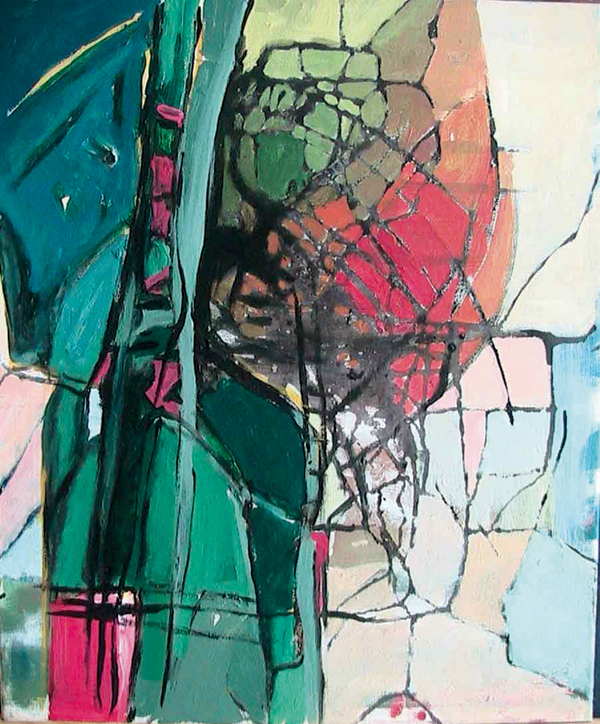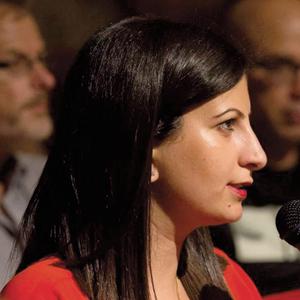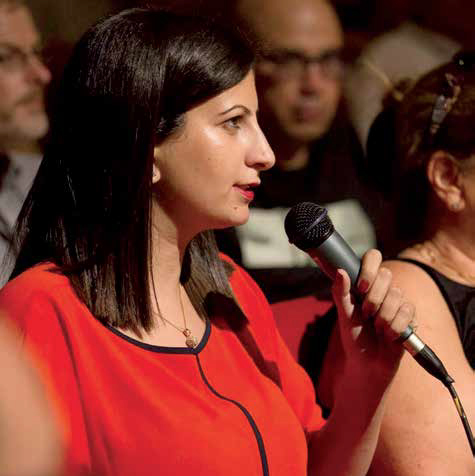Samar Abdel Jaber (b. 1985) holds a bachelor’s degree in computer engineering from Beirut Arab University (2008) and is currently working in Dubai. In 2008, she published her first collection of poetry, Wa fi rewayaten okhra (And There Are Other Accounts, Malameh Publishing House, Egypt), and participated in the Arab Female Poets’ Festival in Damascus, Syria. In 2012, she won a prize granted by the Danish Institute in Damascus for the best poems that reflect the status of Arab societies after the Arab Spring and its effect on youth, and thus participated in the Copenhagen Literature Festival that year. Samar’s second book, Madha law konna ashbahan (What If We Were Ghosts, Dar Al Ahleyya Publishers, Jordan, 2013), won the Palestinian Young Writer of the Year Award granted by A.M. Qattan Foundation, Palestine. In 2015, Samar won a grant through SELAT, Links Through the Arts project, organized by A.M. Qattan Foundation and the Prince Claus Fund, to publish her third book titled Kawkab mansey (The Forgotten Planet) at Dar Al Ahleyya, Jordan. In 2016, she participated in the Khan Al Fonoun Festival in Amman, Jordan. She blogs at www.summer-blues.blogspot.com and www.tholatheyyat.blogspot.com.
“Samar Abdel Jaber’s poems convey a clarity, sensitivity, and simplicity that are nevertheless brimming with insight and detail. Her work blends current poetry trends with more than fifty years of experience to create a poetic voice that communicates honesty, gentleness, and humility.”
Abbas Baidoun
An Elegy
To my grandfather, in his grave,
his final refuge
So,
Tomorrow
The Mesaharatyi will not call your name
In the neighborhood
At dawn
And your cane,
Leaning against the wall
Will await your hand
Forevermore
Your voice
Will not tell me tales of Palestine
On my next visit
And because you are the Eid,ii
There will never be another Eid after
Yesterday when your heart stopped beating
Haifa,iii with its sixth sense
Knew
A mysterious wind, swooped there suddenly
The rocks,
In the depths of the sea
Tried to float to sail towards you
The trees
Tried to uproot themselves
To go to you
In the house that was your home
A severe darkness suddenly fell:
A curse that would follow its tenants
Forevermore.
Last night in Haifa
The moon concealed itself behind a cloud
And the sun woke up wearily
You depart from your bed
For the last time…
Carried upon shoulders
Your eyes closed
Your body descends to its grave
The sand falls upon you
Someone carefully carves your name
On the tombstone
A hidden rain
Falls profusely
In that place
Your body descends
To its refuge grave
And in that moment
A beautiful child is born
with eyes, blue as yours
And a name like your name.
From the collection The Forgotten Planet.

Hell
During my childhood, they told me that I must pray so God doesn’t put me in hell, they even used to say that God would dangle a noose from the ceiling at night to choke me if I lied…
I didn’t lie very often. But when I lay in bed to face the ceiling, I felt an immense fear.
I would think of my father and mother, and those who did not pray five times a day and I would feel sad as I thought of them burning in hell. It was a harsh feeling. I was a child, and so I easily believed, and was sad for a long time.
Now, I feel free of fear, of worry, and of that sorrow. But I very much wish that they did not frighten me so much when I was little, because I could have spent many nights imagining, as I fell asleep, things more beautiful than a noose dangling from the ceiling.
Now, I imagine more beautiful things, and do not care about reasons of existence.
Published on the blog Summer-blues.blogspot.com.
The Dead
The dead are better than fine
So please stop imagining they miss you
And that they visit you:
That which shakes your window at night
Autumn wind, not their hands.
That sound coming from the study
Originates from an insect
Building itself a home between old books
The dreams you see them in
Are just a creation of your minds
The dead are at home in their coffins
And are very well
Conversing at night
Each of them telling a personal sorrowful story of life
And mocking us
Laughing at much of their then-little troubles
The dead behind thick slabs of rock
Cannot see your faces
Cannot hear a thing you say on your annual visit to their graves
Are unreached by the scent of flowers you bring
The dead, with time,
Also forget you.
From the collection What If We Were Ghosts?
All translations from Arabic by Khalid F. Khalili.
i Ramadan’s traditional pre-dawn drummer.
ii Eid al-Fitr is an important religious holiday that is celebrated by Muslims worldwide to mark the end of Ramadan.
iii Haifa is the poet’s home city in occupied Palestine.



